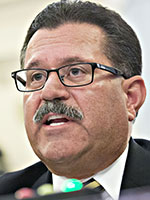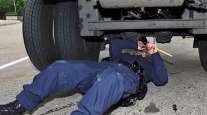Senior Reporter
CVSA Seeks Solution to Allow Inspectors to Ticket Shippers for Cargo Securement Violations

The Commercial Vehicle Safety Alliance has asked U.S. and Canadian trucking regulators to explore a solution that would permit roadside inspectors to cite shippers — not just drivers and motor carriers — for cargo securement violations in sealed trailers and intermodal containers.
“These sealed loads have been found with cargo securement violations bringing up the question of who is responsible for the proper securement of the load, the shipper of the cargo, the motor carrier or the driver of the sealed load,” CVSA Executive Director Collin Mooney said in a letter to regulators.

Mooney
“Shippers need to properly secure the contents of a load prior to sealing, therefore not risking the safety of the driver or the motoring public,” Mooney’s letter said. “Loads that move from the shipper to a motor carrier in the current practice place the responsibility on the receiver of the freight.”
Even when an inspector finds a securement violation in a load sealed and loaded by the shipper, the driver is issued the violation ticket or citation for the infraction, and the vehicle is placed out of service until the load is properly secured.
The letter was sent May 8 to Raymond Martinez, administrator of the Federal Motor Carrier Safety Administration, and Allison Fradette, CEO of the Canadian Council of Motor Transport Administrators.

Martinez
FMCSA Spokesman Duane DeBruyne confirmed receipt of the letter and said it is under review by the agency.
“CCMTA members will be discussing this issue at their upcoming meetings through its Program Committee on Compliance and Regulatory Affairs and will make recommendations to the CCMTA Board of Directors on how to proceed,” Spokesman Martin Rochon said.
Mooney’s letter comes after CVSA developed a working group composed of law enforcement officials and commercial vehicle industry representatives that has been “for two or three years” discussing possible solutions for shippers and drivers regarding secured loads in trailers and containers.

Fradette
Seals on trailers, which typically feature a lock that can be removed only with a bolt cutter, permit a load to be undisturbed and secure. If a seal is broken, sealed trailers offer a method for determining where a security breach has occurred.
“More and more loads are being sealed all the time just for security reasons,” said Kerri Wirachowsky, director of CVSA’s roadside inspection program.
“It’s not a question of whether the roadside person is picking the right guy to cite or lay charges against,” Wirachowsky said. “There’s only one option: The carrier. And then if the inspector wants to lay a charge against the driver, he can. But there’s no ability to go back and charge a shipper.”
The letter sent to regulators was intended to spark a conversation, she said.
Checking for load securement in a trailer sealed or unsealed is a requirement for a Level I inspection. But not all inspectors follow the requirement, Wirachowsky told Transport Topics.
Upon completion of a safety inspection, if no cargo securement issues are detected, inspectors will reseal the load with a new seal. When a law enforcement official applies their seal to the load after inspection, it means the contents have been secured to meet the requirements of the cargo securement regulations and standards in both the United States and Canada, CVSA said.
Wirachowsky said that drivers are told they can’t break a seal to check inside a trailer. But if they are cited for a violation and did not participate in the loading process, their primary recourse is for their employer to file a civil complaint against a shipper.




